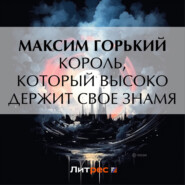По всем вопросам обращайтесь на: info@litportal.ru
(©) 2003-2024.
✖
The Man Who Was Afraid
Настройки чтения
Размер шрифта
Высота строк
Поля
“Cold – that’s true,” said Foma and became pensive. “Every person must do his work in a first class manner,” said the distiller’s son, instructively. “And if you become some one’s s mistress you must perform your duty in the best way possible, if you are a decent woman. Well, shall we have a drink?”
They had a drink. And naturally they got drunk. A large and noisy company gathered in the hotel toward evening. And Foma, intoxicated, but sad and calm, spoke to them with heavy voice:
“That’s the way I understand it: some people are worms, others sparrows. The sparrows are the merchants. They peck the worms. Such is their destined lot. They are necessary But I and you – all of you – are to no purpose. We live so that we cannot be compared to anything – without justification, merely at random. And we are utterly unnecessary. But even these here, and everybody else, to what purpose are they? You must understand that. Brethren! We shall all burst! By God! And why shall we burst? Because there is always something superfluous in us, there is something superfluous in our souls. And all our life is superfluous! Comrades! I weep. To what purpose am I? I am unnecessary! Kill me, that I may die; I want to die.”
And he wept, shedding many drunken tears. A drunken, small-sized, swarthy man sat down close to him, began to remind him of something, tried to kiss him, and striking a knife against the table, shouted:
“True! Silence! These are powerful words! Let the elephants and the mammoths of the disorder of life speak! The raw Russian conscience speaks holy words! Roar on, Gordyeeff! Roar at everything!” And again he clutched at Foma’s shoulders, flung himself on his breast, raising to Foma’s face his round, black, closely-cropped head, which was ceaselessly turning about on his shoulders on all sides, so that Foma was unable to see his face, and he was angry at him for this, and kept on pushing him aside, crying excitedly:
“Get away! Where is your face? Go on!”
A deafening, drunken laughter smote the air about them, and choking with laughter, the son of the brandy-distiller roared to someone hoarsely:
“Come to me! A hundred roubles a month with board and lodging! Throw the paper to the dogs. I’ll give you more!”
And everything rocked from side to side in rhythmic, wave-like movement. Now the people moved farther away from Foma, now they came nearer to him, the ceiling descended, the floor rose, and it seemed to Foma that he would soon be flattened and crushed. Then he began to feel that he was floating somewhere over an immensely wide and stormy river, and, staggering, he cried out in fright:
“Where are we floating? Where is the captain?”
He was answered by the loud, senseless laughter of the drunken crowd, and by the shrill, repulsive shout of the swarthy little man:
“True! we are all without helm and sails. Where is the captain? What? Ha, ha, ha!”
Foma awakened from this nightmare in a small room with two windows, and the first thing his eyes fell upon was a withered tree. It stood near the window; its thick trunk, barkless, with a rotten heart, prevented the light from entering the room; the bent, black branches, devoid of leaves, stretched themselves mournfully and helplessly in the air, and shaking to and fro, they creaked softly, plaintively. A rain was falling; streams of water were beating against the window-panes, and one could hear how the water was falling to the ground from the roof, sobbing there. This sobbing sound was joined by another sound – a shrill, often interrupted, hasty scratching of a pen over paper, and then by a certain spasmodic grumbling.
When he turned with difficulty his aching, heavy head on the pillow, Foma noticed a small, swarthy man, who sat by the table hastily scratching with his pen over the paper, shaking his round head approvingly, wagging it from side to side, shrugging his shoulders, and, with all his small body clothed in night garments only, constantly moving about in his chair, as though he were sitting on fire, and could not get up for some reason or other. His left hand, lean and thin, was now firmly rubbing his forehead, now making certain incomprehensible signs in the air; his bare feet scraped along the floor, a certain vein quivered on his neck, and even his ears were moving. When he turned toward Foma, Foma saw his thin lips whispering something, his sharp-pointed nose turned down to his thin moustache, which twitched upward each time the little man smiled. His face was yellow, bloated, wrinkled, and his black, vivacious small sparkling eyes did not seem to belong to him.
Having grown tired of looking at him, Foma slowly began to examine the room with his eyes. On the large nails, driven into the walls, hung piles of newspapers, which made the walls look as though covered with swellings. The ceiling was pasted with paper which had been white once upon a time; now it was puffed up like bladders, torn here and there, peeled off and hanging in dirty scraps; clothing, boots, books, torn pieces of paper lay scattered on the floor. Altogether the room gave one the impression that it had been scalded with boiling water.
The little man dropped the pen, bent over the table, drummed briskly on its edge with his fingers and began to sing softly in a faint voice:
“Take the drum and fear not, – And kiss the sutler girl aloud – That’s the sense of learning – And that’s philosophy.”
Foma heaved a deed sigh and said:
“May I have some seltzer?”
“Ah!” exclaimed the little man, and jumping up from his chair, appeared at the wide oilcloth-covered lounge, where Foma lay. “How do you do, comrade! Seltzer? Of course! With cognac or plain?”
“Better with cognac,” said Foma, shaking the lean, burning hand which was outstretched to him, and staring fixedly into the face of the little man.
“Yegorovna!” cried the latter at the door, and turning to Foma, asked: “Don’t you recognise me, Foma Ignatyevich?”
“I remember something. It seems to me we had met somewhere before.”
“That meeting lasted for four years, but that was long ago! Yozhov.”
“Oh Lord!” exclaimed Foma, in astonishment, slightly rising from the lounge. “Is it possible that it is you?”
“There are times, dear, when I don’t believe it myself, but a real fact is something from which doubt jumps back as a rubber ball from iron.”
Yozhov’s face was comically distorted, and for some reason or other his hands began to feel his breast.
“Well, well!” drawled out Foma. “But how old you have grown! Ah-ah! How old are you?”
“Thirty.”
“And you look as though you were fifty, lean, yellow. Life isn’t sweet to you, it seems? And you are drinking, too, I see.”
Foma felt sorry to see his jolly and brisk schoolmate so worn out, and living in this dog-hole, which seemed to be swollen from burns. He looked at him, winked his eyes mournfully and saw that Yozhov’s face was for ever twitching, and his small eyes were burning with irritation. Yozhov was trying to uncork the bottle of water, and thus occupied, was silent; he pressed the bottle between his knees and made vain efforts to take out the cork. And his impotence moved Foma.
“Yes; life has sucked you dry. And you have studied. Even science seems to help man but little,” said Gordyeeff plaintively.
“Drink!” said Yozhov, turning pale with fatigue, and handing him the glass. Then he wiped his forehead, seated himself on the lounge beside Foma, and said:
“Leave science alone! Science is a drink of the gods; but it has not yet fermented sufficiently, and, therefore is not fit for use, like vodka which has not yet been purified from empyreumatic oil. Science is not ready for man’s happiness, my friend. And those living people that use it get nothing but headaches. Like those you and I have at present. Why do you drink so rashly?”
“I? What else am I to do?” asked Foma, laughing. Yozhov looked at Foma searchingly with his eyes half closed, and he said:
“Connecting your question with everything you jabbered last night, I feel within my troubled soul that you, too, my friend, do not amuse yourself because life is cheerful to you.”
“Eh!” sighed Foma, heavily, rising from the lounge. “What is my life? It is something meaningless. I live alone. I understand nothing. And yet there is something I long for. I yearn to spit on all and then disappear somewhere! I would like to run away from everything. I am so weary!”
“That’s interesting!” said Yozhov, rubbing his hands and turning about in all directions. “This is interesting, if it is true and deep, for it shows that the holy spirit of dissatisfaction with life has already penetrated into the bed chambers of the merchants, into the death chambers of souls drowned in fat cabbage soup, in lakes of tea and other liquids. Give me a circumstantial account of it. Then, my dear, I shall write a novel.”
“I have been told that you have already written something about me?” inquired Foma, with curiosity, and once more attentively scrutinized his old friend unable to understand what so wretched a creature could write.
“Of course I have! Did you read it?”
“No, I did not have the chance.”
“And what have they told you?”
“That you gave me a clever scolding.”
“Hm! And doesn’t it interest you to read it yourself?” inquired Yozhov, scrutinizing Gordyeeff closely.
“I’ll read it!” Foma assured him, feeling embarrassed before Yozhov, and that Yozhov was offended by such regard for his writings. “Indeed, it is interesting since it is about myself,” he added, smiling kindheartedly at his comrade.
In saying this he was not at all interested, and he said it merely out of pity for Yozhov. There was quite another feeling in him; he wished to know what sort of a man Yozhov was, and why he had become so worn out. This meeting with Yozhov gave rise in him to a tranquil and kind feeling; it called forth recollections of his childhood, and these flashed now in his memory, – flashed like modest little lights, timidly shining at him from the distance of the past. Yozhov walked up to the table on which stood a boiling samovar, silently poured out two glasses of tea as strong as tar, and said to Foma:
“Come and drink tea. And tell me about yourself.”
“I have nothing to tell you. I have not seen anything in life. Mine is an empty life! You had better tell me about yourself. I am sure you know more than I do, at any rate.”
Yozhov became thoughtful, not ceasing to turn his whole body and to waggle his head. In thoughtfulness his face became motionless, all its wrinkles gathered near his eyes and seemed to surround them with rays, and because of this his eyes receded deeper under his forehead.
“Yes, my dear, I have seen a thing or two, and I know a great deal,” he began, with a shake of the head. “And perhaps I know even more than it is necessary for me to know, and to know more than it is necessary is just as harmful to man as it is to be ignorant of what it is essential to know. Shall I tell you how I have lived? Very well; that is, I’ll try. I have never told any one about myself, because I have never aroused interest in anyone. It is most offensive to live on earth without arousing people’s interest in you!”
They had a drink. And naturally they got drunk. A large and noisy company gathered in the hotel toward evening. And Foma, intoxicated, but sad and calm, spoke to them with heavy voice:
“That’s the way I understand it: some people are worms, others sparrows. The sparrows are the merchants. They peck the worms. Such is their destined lot. They are necessary But I and you – all of you – are to no purpose. We live so that we cannot be compared to anything – without justification, merely at random. And we are utterly unnecessary. But even these here, and everybody else, to what purpose are they? You must understand that. Brethren! We shall all burst! By God! And why shall we burst? Because there is always something superfluous in us, there is something superfluous in our souls. And all our life is superfluous! Comrades! I weep. To what purpose am I? I am unnecessary! Kill me, that I may die; I want to die.”
And he wept, shedding many drunken tears. A drunken, small-sized, swarthy man sat down close to him, began to remind him of something, tried to kiss him, and striking a knife against the table, shouted:
“True! Silence! These are powerful words! Let the elephants and the mammoths of the disorder of life speak! The raw Russian conscience speaks holy words! Roar on, Gordyeeff! Roar at everything!” And again he clutched at Foma’s shoulders, flung himself on his breast, raising to Foma’s face his round, black, closely-cropped head, which was ceaselessly turning about on his shoulders on all sides, so that Foma was unable to see his face, and he was angry at him for this, and kept on pushing him aside, crying excitedly:
“Get away! Where is your face? Go on!”
A deafening, drunken laughter smote the air about them, and choking with laughter, the son of the brandy-distiller roared to someone hoarsely:
“Come to me! A hundred roubles a month with board and lodging! Throw the paper to the dogs. I’ll give you more!”
And everything rocked from side to side in rhythmic, wave-like movement. Now the people moved farther away from Foma, now they came nearer to him, the ceiling descended, the floor rose, and it seemed to Foma that he would soon be flattened and crushed. Then he began to feel that he was floating somewhere over an immensely wide and stormy river, and, staggering, he cried out in fright:
“Where are we floating? Where is the captain?”
He was answered by the loud, senseless laughter of the drunken crowd, and by the shrill, repulsive shout of the swarthy little man:
“True! we are all without helm and sails. Where is the captain? What? Ha, ha, ha!”
Foma awakened from this nightmare in a small room with two windows, and the first thing his eyes fell upon was a withered tree. It stood near the window; its thick trunk, barkless, with a rotten heart, prevented the light from entering the room; the bent, black branches, devoid of leaves, stretched themselves mournfully and helplessly in the air, and shaking to and fro, they creaked softly, plaintively. A rain was falling; streams of water were beating against the window-panes, and one could hear how the water was falling to the ground from the roof, sobbing there. This sobbing sound was joined by another sound – a shrill, often interrupted, hasty scratching of a pen over paper, and then by a certain spasmodic grumbling.
When he turned with difficulty his aching, heavy head on the pillow, Foma noticed a small, swarthy man, who sat by the table hastily scratching with his pen over the paper, shaking his round head approvingly, wagging it from side to side, shrugging his shoulders, and, with all his small body clothed in night garments only, constantly moving about in his chair, as though he were sitting on fire, and could not get up for some reason or other. His left hand, lean and thin, was now firmly rubbing his forehead, now making certain incomprehensible signs in the air; his bare feet scraped along the floor, a certain vein quivered on his neck, and even his ears were moving. When he turned toward Foma, Foma saw his thin lips whispering something, his sharp-pointed nose turned down to his thin moustache, which twitched upward each time the little man smiled. His face was yellow, bloated, wrinkled, and his black, vivacious small sparkling eyes did not seem to belong to him.
Having grown tired of looking at him, Foma slowly began to examine the room with his eyes. On the large nails, driven into the walls, hung piles of newspapers, which made the walls look as though covered with swellings. The ceiling was pasted with paper which had been white once upon a time; now it was puffed up like bladders, torn here and there, peeled off and hanging in dirty scraps; clothing, boots, books, torn pieces of paper lay scattered on the floor. Altogether the room gave one the impression that it had been scalded with boiling water.
The little man dropped the pen, bent over the table, drummed briskly on its edge with his fingers and began to sing softly in a faint voice:
“Take the drum and fear not, – And kiss the sutler girl aloud – That’s the sense of learning – And that’s philosophy.”
Foma heaved a deed sigh and said:
“May I have some seltzer?”
“Ah!” exclaimed the little man, and jumping up from his chair, appeared at the wide oilcloth-covered lounge, where Foma lay. “How do you do, comrade! Seltzer? Of course! With cognac or plain?”
“Better with cognac,” said Foma, shaking the lean, burning hand which was outstretched to him, and staring fixedly into the face of the little man.
“Yegorovna!” cried the latter at the door, and turning to Foma, asked: “Don’t you recognise me, Foma Ignatyevich?”
“I remember something. It seems to me we had met somewhere before.”
“That meeting lasted for four years, but that was long ago! Yozhov.”
“Oh Lord!” exclaimed Foma, in astonishment, slightly rising from the lounge. “Is it possible that it is you?”
“There are times, dear, when I don’t believe it myself, but a real fact is something from which doubt jumps back as a rubber ball from iron.”
Yozhov’s face was comically distorted, and for some reason or other his hands began to feel his breast.
“Well, well!” drawled out Foma. “But how old you have grown! Ah-ah! How old are you?”
“Thirty.”
“And you look as though you were fifty, lean, yellow. Life isn’t sweet to you, it seems? And you are drinking, too, I see.”
Foma felt sorry to see his jolly and brisk schoolmate so worn out, and living in this dog-hole, which seemed to be swollen from burns. He looked at him, winked his eyes mournfully and saw that Yozhov’s face was for ever twitching, and his small eyes were burning with irritation. Yozhov was trying to uncork the bottle of water, and thus occupied, was silent; he pressed the bottle between his knees and made vain efforts to take out the cork. And his impotence moved Foma.
“Yes; life has sucked you dry. And you have studied. Even science seems to help man but little,” said Gordyeeff plaintively.
“Drink!” said Yozhov, turning pale with fatigue, and handing him the glass. Then he wiped his forehead, seated himself on the lounge beside Foma, and said:
“Leave science alone! Science is a drink of the gods; but it has not yet fermented sufficiently, and, therefore is not fit for use, like vodka which has not yet been purified from empyreumatic oil. Science is not ready for man’s happiness, my friend. And those living people that use it get nothing but headaches. Like those you and I have at present. Why do you drink so rashly?”
“I? What else am I to do?” asked Foma, laughing. Yozhov looked at Foma searchingly with his eyes half closed, and he said:
“Connecting your question with everything you jabbered last night, I feel within my troubled soul that you, too, my friend, do not amuse yourself because life is cheerful to you.”
“Eh!” sighed Foma, heavily, rising from the lounge. “What is my life? It is something meaningless. I live alone. I understand nothing. And yet there is something I long for. I yearn to spit on all and then disappear somewhere! I would like to run away from everything. I am so weary!”
“That’s interesting!” said Yozhov, rubbing his hands and turning about in all directions. “This is interesting, if it is true and deep, for it shows that the holy spirit of dissatisfaction with life has already penetrated into the bed chambers of the merchants, into the death chambers of souls drowned in fat cabbage soup, in lakes of tea and other liquids. Give me a circumstantial account of it. Then, my dear, I shall write a novel.”
“I have been told that you have already written something about me?” inquired Foma, with curiosity, and once more attentively scrutinized his old friend unable to understand what so wretched a creature could write.
“Of course I have! Did you read it?”
“No, I did not have the chance.”
“And what have they told you?”
“That you gave me a clever scolding.”
“Hm! And doesn’t it interest you to read it yourself?” inquired Yozhov, scrutinizing Gordyeeff closely.
“I’ll read it!” Foma assured him, feeling embarrassed before Yozhov, and that Yozhov was offended by such regard for his writings. “Indeed, it is interesting since it is about myself,” he added, smiling kindheartedly at his comrade.
In saying this he was not at all interested, and he said it merely out of pity for Yozhov. There was quite another feeling in him; he wished to know what sort of a man Yozhov was, and why he had become so worn out. This meeting with Yozhov gave rise in him to a tranquil and kind feeling; it called forth recollections of his childhood, and these flashed now in his memory, – flashed like modest little lights, timidly shining at him from the distance of the past. Yozhov walked up to the table on which stood a boiling samovar, silently poured out two glasses of tea as strong as tar, and said to Foma:
“Come and drink tea. And tell me about yourself.”
“I have nothing to tell you. I have not seen anything in life. Mine is an empty life! You had better tell me about yourself. I am sure you know more than I do, at any rate.”
Yozhov became thoughtful, not ceasing to turn his whole body and to waggle his head. In thoughtfulness his face became motionless, all its wrinkles gathered near his eyes and seemed to surround them with rays, and because of this his eyes receded deeper under his forehead.
“Yes, my dear, I have seen a thing or two, and I know a great deal,” he began, with a shake of the head. “And perhaps I know even more than it is necessary for me to know, and to know more than it is necessary is just as harmful to man as it is to be ignorant of what it is essential to know. Shall I tell you how I have lived? Very well; that is, I’ll try. I have never told any one about myself, because I have never aroused interest in anyone. It is most offensive to live on earth without arousing people’s interest in you!”

















